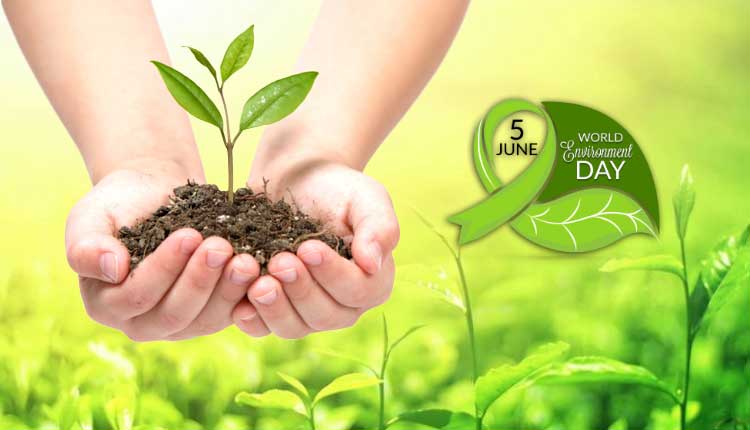Bhubaneswar: This year marks the Golden Jubilee of the historic UN Conference on the Human Environment in Stockholm in 1972, which led to the designation of 5th of June as the World Environment Day (WED), with the theme “Only One Earth”, highlighting our roles and responsibilities we have for the planet. Now, fifty years later, we are again at Stockholm as the host city with the same theme “Only One Earth”, gives us an opportunity to evaluate our 50 years of global environmental action and our commitment for a future roadmap. There is absolutely no doubt that this planet is our only home, whose finite resources we must safeguard and utilize in a sustainable manner to maintain the ecological balance for our future generations.
Climate change is the biggest challenge humanity is facing resulting in a rapidly eroding ecosystem. Humanity continues to do more harm than good to nature, with the environment getting cataclysmic and the planet facing several existential threats requiring urgent remedial measures. The Paris Agreement aims at arresting the increase in the global average temperature to well below 2°C above pre-industrial levels and urges the countries to limit global temperature rise to 1.5°C. The world is already 1.2°C warmer than pre-industrial level and now every little rise in temperature counts. Research shows that with 2°C of global warming we will have more intense droughts and more devastating floods, more wildfires and more storms. But this has become already evident even today with only 1.2°C rise.
Since the 1972 United Nations Conference on the Human Environment, we have been debating about most aspects of environmental protection from burning of fossil fuels to trade in endangered species, waste management, plastic pollution, habitat loss, sea acidification, biodiversity loss, mangroves, coral reef, nuclear waste to waste generated by the fashion industry. In the last couple of years, the environmental movement has come to the surface in a more radical way based on possible impacts and perceived risk, but we are still struggling to find a clear roadmap to mitigate climate change. The development models and subsequent unsustainable patterns of consumption and production have pushed us beyond the boundaries of the triple planetary crisis of managing climate change, nature and biodiversity loss, and pollution & waste. We all have seen the impacts, be it the Super Cyclone of Odisha in 1999, Kedarnath flashflood disaster 2013, the floods in Kerala and Chennai, cyclone Fani & Amphan, and heavy monsoon in Odisha, Bihar, Himachal Pradesh, Uttarakhand, extreme heat waves in India, wild fires in Australia, USA and Canada, severe drought in Ethiopia, fast melting of polar and Himalayan glaciers. Different types of disasters like storms, floods, heat waves, and droughts are becoming very frequent and unpredictable with rising temperature.
The failure to mitigate and adapt to climate change is the most impactful risk facing the world, more devastating than the weapons of mass destruction and water crises, according to the World Economic Forum’s Global Risks Report 2021. Extreme events are the new norm due to human-induced climate change. Tackling climate change demands consensus and collective action. We need to be determined to address climate change like we addressed the elimination of Polio. And we need to ensure a secure environment for all, like we are working towards food security for all. Business as usual cannot offer anything of that scale this moment. We need to call for our ancient wisdom. The wisdom of Vasudhaiva Kutumbakam, where all the earthly creatures are considered as the family of Mother Earth in contrast to the anthropocentric approach we have adopted so far. Each life in the ecosystem is wholesome and is a vital component of the family. This is why the Vedas direct us to work for the good of all beings instead of being limited to only the human. This also reflects when Hindus worship rivers, mountains, plants, and have symbolically associated the animals, birds & insects with different deities.
There is also a great emphasis attached to the five elements of nature (Pancha- Mahabhuta) – the ‘earth’, ‘water’, ‘air’, ‘fire’ and the ‘space’ and believing that everything emanates from these five elements and everything must get dissolved in these five elements. Hindus cremate the bodies of their loved ones after their death, in order to send the bodies quickly back to the Pancha-Mahabhuta. Although, few communities belonging to the Hindus bury their dead, but the burial is usually accompanied by using abundant amounts of turmeric, salt and other herbs so that the body decomposes quickly and gets dissolved into the Panchamahabuta. It signifies how environment and ecosystem is given supreme importance. It is a very pragmatic and sustainable approach towards believing in the ecological balance. The importance of cremation was also understood well when the world faced the fury of deaths caused by Covid19.
The world seems to have started waking up to our ancient wisdom, like the way everyone believed in Yoga and Ayurveda. Thanks to the leadership of the Prime Minister Modi who emphatically expressed in Dec 2018 before the UN Secretary General Antonio Guterres that the motivation for his strong commitment to climate action is rooted in the ancient Hindu scriptures, the Vedas. Indeed, Vedas reveal a clear concept about the earth’s ecosystems and the necessity for maintaining her balance. Let us move to an ecology-based or eco-centric approach from the anthropocentric or human-centric approach, at the earliest possible time.
About Author: Dr Binaya Bhusan Jena, is a professor at NIFT Bhubaneswar and the Chairman for Textile Association of Odisha, known for his model of “Farm to Fashion”.




















